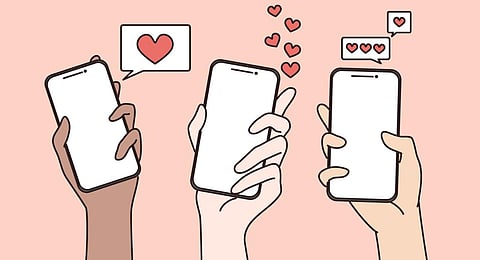
- LIFESTYLE
- FASHION
- FOOD
- ENTERTAINMENT
- EVENTS
- CULTURE
- VIDEOS
- WEB STORIES
- GALLERIES
- GADGETS
- CAR & BIKE
- SOCIETY
- TRAVEL
- NORTH EAST
- INDULGE CONNECT

Ever experienced trauma-dumping on the first date? Or even before a first date? You may have been subjected to ‘floodlighting.’ It’s not a dating trend as much as it’s a behavioural pattern where someone unleashes a torrent of intensely personal information to their potential partner in the very beginning of a relationship. While some may overshare unintentionally, some people might be sharing deeply emotional details about their lives as a means of mimicking a strong connection with someone.
If you’re in a situationship with someone or have been involved with someone for a short time and they bombard you with details about their deepest traumas or share a lot about their struggles within a very short time, chances are they’re using a common manipulative tactic. Not only are they testing water by observing your reactions to their vulnerabilities, they are also fast forwarding your relationship. While healthy relationships are forged over time with meaningful exchanges over a certain period of time, floodlighting can let someone manipulate you into thinking you’re intensely close just because they have shared something deeply personal with you and not because they’ve proved themselves as good partners.
Floodlighting is a contrast to love-bombing where one person may shower their partners with love, gifts, attention and acts of service during the early stages of their relationship. In contrast to the gradual vulnerability that typically evolves over time for most couples, floodlighting accelerates emotional closeness, and that can be quite misleading.
According to Brené Brown, author of The Power of Vulnerability: Teachings of Authenticity, Connections and Courage, floodlight occurs when we share too much information about our lives in an attempt to protect ourselves from real vulnerability.
“Oversharing? Not vulnerability,” she wrote in her book. “I call it floodlighting.” Brown also shared an example which shows that floodlighting doesn;t just pertain to couples but in other situations as well. “I'm scared to let you know that I just wrote this article and I'm under total fire for it and people are making fun of me and I'm feeling hurt -- the same thing that I told someone in an intimate conversation. So what I do is I floodlight you with it,” Brown shares.
“I don't know you very well or I'm in front of a big group, or it's a story that I haven't processed enough to be sharing with other people - and you immediately respond "hands up; push me away" and I go, "See? No one cares about me. No one gives a s*** that I'm hurting. I knew it."
She further added, It's how we protect ourselves from vulnerability. We just engage in a behavior that confirms our fear.”
When someone you’re considering as a partner overshares wilfully, they’re using their past as some armour. Actor and podcaster Becca Tobin says, “It presents as somebody who’s very open and very vulnerable. When they overshare a lot right up front … they’re floodlighting you, flashing these lights into your face. Essentially, it’s their armour to make you think they’re very open.”
If you find yourself on the receiving end of floodlighting, it’s important to set boundaries while still being compassionate. You can gently redirect the conversation to lighter subjects and remind your date that there’s no rush in getting to know each other.
For those who may have used floodlighting, it’s essential to remember that emotional intimacy develops gradually, not all at once. While vulnerability can enhance dating, it should be shared at a suitable pace.
As emotionally intense dating trends like floodlighting become more common, the dating landscape for Gen Z continues to blend quick connections with the pursuit of lasting relationships. Whether floodlighting stems from a subconscious coping mechanism or a misdirected effort to connect, one thing remains clear: a slow and steady approach is still the most effective.